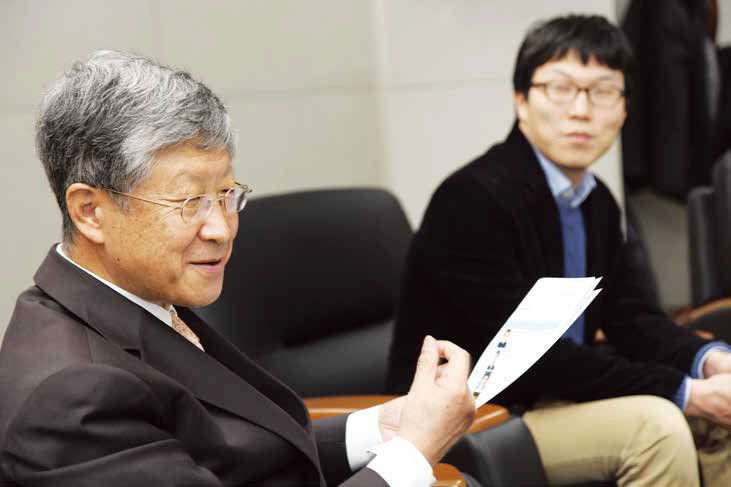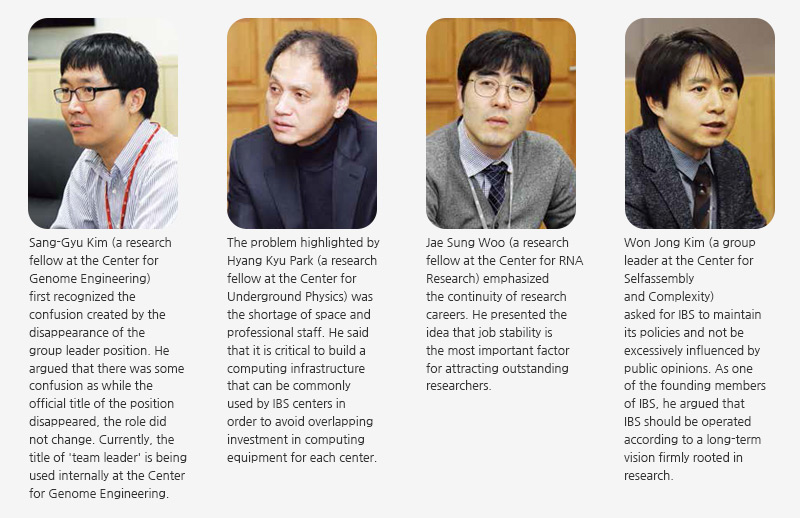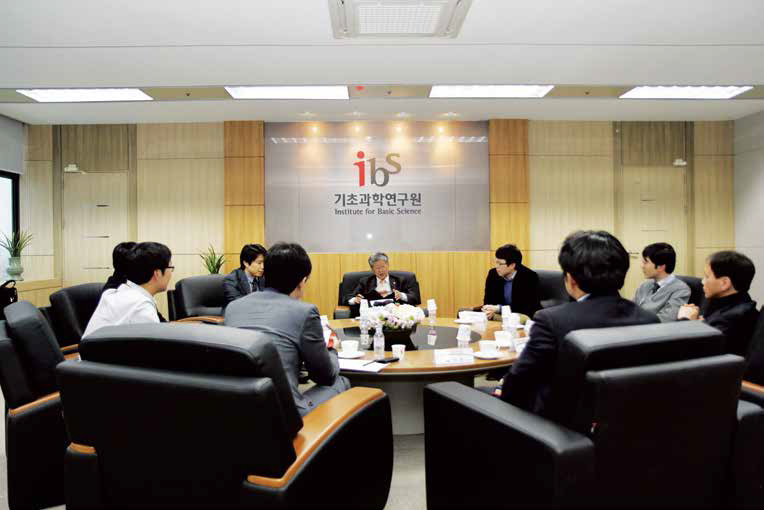
Changes to the group leader system and the importance of roles over titles
The first issue addressed during the conversation was group leaders. The group leader system was one of the core structural components of IBS. However, disputes over the selection of group leaders continued since its inauguration. These disputes were due to the suspicion that group leaders were selected based more on academic or social networks rather than on the candidates’ competencies because they were appointed or recommended directly by IBS directors. This criticism, however, was somewhat unfair to IBS because it had prepared its own evaluation system in relation to the selection of group leaders. After all, IBS had decided to improve the group leader system.
“When I worked at the Max Planck Institute, my position was a group leader. After I moved to IBS, I was a little confused because while my job title was vague, my job was similar to my previous role. It is common that research teams are created naturally according to each specific field as a research center grows. If this is the case, a team leader needs a separate job title. In our center, they are called team leaders, but I sense that it may be necessary to give them a job title equivalent to a group leader.”
Sang-Gyu Kim (a research fellow at the Center for Genome Engineering, HQ), who opened the conversation, noted the confusion created by the elimination of the group leader position. According to him, it might be still necessary to give the official title to the leader of each small group. The associate director system has been proposed as an alternative to this. Won Jong Kim (a research fellow at the Center for Self-assembly and Complexity, POSTECH ), however, cited that the associate director system was not an entirely proper substitute for the group leader system. “Group leaders were at the helm of the research organization at IBS. They played a central role in executing practical work. Logically, it is necessary to have one person in each research area and each team, but it may not be practical to increase the number of associate directors unlimitedly according to the number of research teams.”
President Kim underlined that the problem of group leaders did not lie in the position but the roles and titles. Clearly, it is necessary to have people who can lead individual research projects; practically, however, it is difficult to revive the group leader system, which had already been converted to a different system. President Kim indicated that a separately designated title, whatever is given, would be sufficient because group leaders still have distinct roles to play even if their official titles disappeared. Citing his experience working at Fermilab as an example, Hyang Kyu Park (a research fellow at the Center for Underground Physics, HQ) also agreed to have another official title for a team leader. As a solution, the president proposed that each center to manage its personnel system and titling autonomously.
“In fact, I believe these issues should be addressed by each center. It may be problematic to apply the same system to all centers because each one is situated differently and has a different organizational structure. Personally, I consider IBS similar to an assembly of equal centers. It is comprised of horizontal relationships, not vertical or hierarchical ones. As long as IBS regulations and policies are not violated, each center can be autonomous and have unique personnel management policies.”
President Kim was concerned, however, about whether such individual operations might cause an unnecessary administrative burden. Therefore, he added that IBS would support each center with administrative processes, such as creating regulations, while maintaining the rule of thumb that each center seeks solutions autonomously.
IBS Complex: A key to solve space issues
The next topic discussed was the lack of space. Jaesung Kwak (a research fellow at the Center for Catalytic Hydrocarbon Functionalizations, KAIST ) emphasized the lack of space, which impedes the ability to conduct research, as being one of the problems that individual centers have been unable to address practically. As this issue had been continually raised internally at IBS, it drew the highest consensus from the conversation participants. Hyang Kyu Park underscored that the situation was even more serious in centers that housed much equipment.
“There is not enough space for research. It is essential for the Center for Underground Physics to have a large-scale computing infrastructure to accommodate its research characteristics. Researchers need to work with a large amount of data. Our center has become full, as new equipment has been purchased in piecemeal.”
While deeply understanding the challenges that centers faced, President Kim suggested that it might be difficult to fundamentally solve the issue of inadequate space until the IBS Complex is built.
“IBS fully acknowledges that there is not enough space. There is also lack of connectivity due to the dispersion of its research facilities. To solve this issue, we are trying our best to accelerate the process for completing the IBS Complex. By 2017, half the Complex will be completed, and by 2021, the construction of the rest of the Complex and the campus centers will be completed. Although this is a long-term project, I have no doubt that it will be finished as planned because the Ministry of Strategy and Finance promised to fulfill the project. In reality, however, I believe we may need to retain the temporary system until the completion of the Complex.”
There was also the opinion that space could be used more efficiently by consolidating commonly used infrastructures as much as possible. Hyang Kyu Park said that he would offer the computing equipment currently used by the Center for Underground Physics if IBS creates a separate computer cluster for all of IBS researchers.
The operating staff, however, presents a fundamentally more difficult problem than space. The point that Hyang Kyu Park made was consistent with this, in that newly acquired equipment is not fully used due to the shortage of professional staff. It was suggested that IBS should increase efforts to resolve this problem in particular as it is challenging to hire professional staff who canmanage computing equipment and also have an understanding of physics.
It was also noted that IBS might need to collaborate with other research institutions while remaining cautious about the expansion of its personnel. According to President Kim, astrophysicists, including members of Korea Astronomy and Space Science Institute, often use the Supercomputer Center at the Korea Institute of Science and Technology Information (KISTI). President Kim stated that one should also seek ways to streamline IBS’ operations rather than expanding the organization, as the construction of a computer cluster had been planned.

Creating the best research environment
Along with the lack of space, career continuity was another important concern that was discussed. Jae Sung Woo (a group leader at the Center for RNA Research, Seoul National University) suggested that IBS should consider career management, as it allows IBS researchers to focus on their research.
“Overseas researchers sometimes ask whether IBS is a good place to build a career as a researcher. They are contemplating whether or not to apply for an IBS research fellow position. However, I can’t give them a clear answer. I will immediately recommend the Center for RNA Research, where I belong, if this is where they are considering. However, situations are different in each center. The research fellow position lacks job security to some degree.”
Jae Sung Woo said that he had given up a professorship to become an IBS research fellow because he believed that he would not be able to focus on his research due to lecture preparation and administrative responsibilities, even though the professor position would be more stable. Jae Sung Woo still believed that he had made the right decision, but emphasized that there should be more appealing components to attract excellent researchers.
“Outstanding researchers are naturally drawn to employment that guarantees their future. I believe that IBS can attract talented researchers if their research experience at IBS is helpful to build their career as a researcher, even if they may have difficulty finding steady, long-term work at IBS. In this regard, I think that it is necessary to create a support system that can ensure the continuity of their research and help them build their careers.”
Byunghee An (a research fellow at the Center for Geometry and Physics, POSTECH) also said that job stability is an important factor for researchers when choosing IBS for their careers. Currently, at the Center for Geometry and Physics, nearly half the research fellows list IBS as their first post-degree employer. However, they remain uncertain about their careers. Byunghee An noted that the tenure system is not a solution to this problem because some of the conditions and regulations are unclear, although the system supposedly guarantees a position for a certain period.
“I think that it will be helpful to clarify the criteria concerning the guaranteed duration of the contract and possibility for contract renewal. It is also necessary to promote the tenure system more actively. Even I was not aware that a five-year tenure was guaranteed when I started working at IBS. Some mathematicians had even said that they would apply to the Korea Institute for Advanced Study rather than IBS if contract renewals were not guaranteed. Efforts made to enhance promotion of the tenure system will be very useful to attract researchers.”
In this regard, Seok Hyun Bae, a head of the Research Support Team, confirmed that the five-year tenure is guaranteed and that he would revise details such as contract renewal before the end of the tenure period. President Kim also agreed that job stability has a great impact on attracting overseas researchers, and therefore, that he would amend related issues in a reasonable manner.
Communication among researchers was also cited as another area for improvement. All the participants agreed on the necessity of designing a vehicle that could facilitate interactions and collaborations among researchers who work in different fields, as this is important in contemporary science technology research. President Kim agreed that a communal space is necessary, but emphasized that it should not result in an unnecessary burden.
“It is not desirable to direct interactions from the top because this might increase unnecessary administrative work. It may be necessary to form official meetings to some degree, but casual meetings voluntarily organized by researchers should come first. I will actively support efforts of young researchers in their 30s and 40s with strong intellectual curiosities to coordinate interactive meetings.” Hyang Kyu Park proposed that efforts to seek joint research, beyond exchanging ideas, would be also useful. “I believe that we can achieve good results if we seek research opportunities in collaboration with researchers in other fields. The research facility at the Center for Underground Physics, where I belong, is located deep underground.
Therefore, it is an appropriate location for experiments that require isolation from the external environment. A typical example can be an experiment on the direction of DNA’s double helix. Not long ago, I learned about research results that demonstrated how cosmic rays influenced molecules in such a way that they formed a constant direction when combining with each other. The research facility of our center will be helpful for verifying such hypotheses because cosmic rays do not reach the facility.”
A clear vision to lead IBS
The conversation is mostly linked to the independence and vision of IBS. This is because research stability and continuity become more difficult to maintain when the scientific community is increasingly pressured by requirements to yield practical outcomes and is subject to public opinions. This is especially notable in the field of basic science, in which one can hardly expect immediate practicality and there is a need for long-term investment. In this light, President Kim reaffirmed IBS’ objective of ‘creating an environment in which researchers can focus on their research.’
“The reason why I am reluctant to develop administrative procedures that might burden researchers is that I believe that the best research environment is where researchers are fully committed to their research. When practical outcomes are produced, intellectual property-related work becomes necessary. To conduct research steadily, it is also necessary to secure funding. These tasks, however, are only secondary to researchers. As long as IBS upholds the principles of conducting basic science research drawn from pure intellectual curiosity, IBS will support researchers by hiring professional staff who can manage such administrative work.”
While supporting President Kim’s direction, the research fellows asked him to maintain the existing IBS policies, despite outside criticisms or demands. There was also the belief that IBS should be more active in internal and external public relations. Noting that IBS could not operate a well-designed system due to public criticism, Sang-Gyu Kim emphasized that IBS should correct its shortcomings by accepting public opinions, but should actively highlight its strengths in order to attract outstanding talent.
Three years since its inauguration, IBS has become the centerpiece of Korea’s basic science. However, there is still much room for improvement. Whether it will become the Korean alternative to the Max Planck Institute or remain as one of many research institutions will depend on future endeavors. In concluding the conversation, President Kim assured those attending that he would try to develop IBS as an ideal basic science research institution based on its uniqueness.
“Currently, the operating budget of IBS is separated from the budget for the research foundation . In addition, unlike other government-funded research institutions, IBS is a research institution under the direct control of the government. By taking full advantage of this situation, I intend to fulfill IBS’ unique vision and objective. There is a chance that what IBS aims for might become deviated from the government’s policy. However, I will continue to convince the public that IBS is on the right track by maintaining the original purpose of IBS—basic science research—as the highest value.”

Many stories were shared during the conversation. President Kim and the participating researchers agreed, however, that the most critical task is to create an environment that attracts researchers and allows them to be fully committed to their research.
















